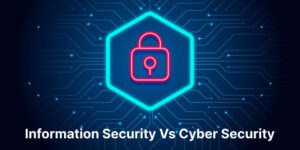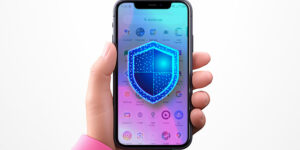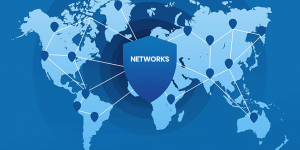
It doesn’t matter where you work; whether it’s in a regular office or a home office, a virtual private network (VPN) is what you need to protect yourself from data breaches on the internet, particularly while utilizing public WiFi networks. What is VPN, How effective are VPNs, and why should companies choose VPNs over other networks? How do VPNs work? What are the disadvantages of utilizing a virtual private network (VPN)? Many such questions come to mind while users plan to choose VPNs.
Online security is one of the primary reasons everybody seems to be obsessed with VPNs. But that’s not just it.
However, worry not! In this post, we shall answer all of your questions concerning VPNs.
So, let’s begin with what is VPN…
What exactly is VPN?
VPN stands for Virtual Private Network. When you use a VPN service, all of your data traffic is routed through an encrypted virtual tunnel.
When you connect to the internet, your IP address is masked, and the location of your machine is hidden from view.
The first and foremost goal of a virtual private network is to protect your identity and privacy when communicating over the internet.
The web, email services, instant messaging, social media handles such as Facebook, and so on are all constructed on top of the familiar Internet Protocol (IP) core. Despite some guidelines, not all online applications are secure. Many users still send data without any security or privacy protection.
Any internet user is vulnerable to cybercriminals stealing bank or credit card information, governments listening in on citizens’ interactions, and other internet users spying on you for various reasons.
A VPN creates a secure tunnel over the internet. In a nutshell, everything you send and receive is encrypted, making it difficult to decipher your messages even if they are intercepted and decoded. VPNs are strong and vital tools for securing yourself and your data, but they have limitations.
How does VPN work?
It’s simple! Let’s understand this with an example:
Let’s say you want to view a website such as happywedding.com. Your computer initiates a request by sending a sequence of packets to accomplish this. If you work in an office, those packets will almost certainly pass via switches and routers on the LAN (local area network) before being sent to the public internet via a router.
Once on the public internet, those packets must traverse through a bevvy of computers before reaching their intended destination. A separate request must be made to a succession of name servers in order to convert the DNS name happywedding.com to an IP address. This information is then relayed to your browser, which redistributes the request to a multitude of devices connected to the public internet. At some point, it will reach the happywedding.com infrastructure, which will also route those packets, fetch a web page (which is composed of multiple components), and return the full page to you.
Typically, each internet request is followed by a string of communication events that occur between multiple sites. Those packets must first be encrypted before being sent to ensure the proper operation of a VPN. This procedure frequently entails concealing both data and information about your underlying IP address. The VPN software preinstalled then transmits those packets to a VPN server situated in a faraway location, which decrypts the data.
A virtual private network (VPN) operates by establishing an encrypted connection between your computer or device and the VPN server.
Whether you use a virtual private network (VPN) or not, everything you do online may be tracked back to your physical location and your device via the device’s IP address. Everything that connects to the internet, from your computer to your phone and tablet, has an IP address that is distinct from the others. A virtual private network (VPN) allows you to conceal your true location and IP address, which will be replaced by the IP address of the VPN server you are connected to.
The majority of reputable VPN companies have servers located all over the world. This provides you with a plethora of connection options as well as access to worldwide content.
Using a VPN, you may maintain a high level of online anonymity while also increasing your security and allowing you to browse the full internet without restriction. A virtual private network (VPN) will encrypt, secure, and anonymize your internet traffic, as well as unblock content from anywhere in the world.
Different types of VPNs
A VPN is useful for boosting your online privacy, security, and independence. It’s difficult to pick which tool best meets your needs because they come in so many shapes. Here are three main types of VPNs
With a VPN, your device is protected from the public Internet. Your data is protected from ISPs, government spying, hackers, and other entities as it transits via this tunnel. These tools fall into three categories:
1. Remote Access VPN
Remote Access VPNs are now the most popular of all. Basically, they connect users to a remote server. This is the basis of most commercial VPN services! They allow you to access the Internet using their own network while encrypting your data. As a result, you may use the Internet anonymously, access websites and content blocked in your region, and protect your data on public and private networks. This VPN is best for personal use and may not be suited for business use.
2. Site-to-site VPNs
Site-to-site VPNs work differently, allowing businesses with several fixed locations to securely connect over the Internet.
Here’s an example to help you understand:
You work for an MNC with an Indian branch in New Jersey. Using a site-to-site VPN, users can share information and resources. This VPN is ideal for large-scale commercial environments that demand secure global communications. But they require specialist equipment to implement. Site-to-site VPNs are further divided into different types, which are as follows:
- Intranet VPN
- Extranet VPN
Here is a brief description of the two:
a. Intranet VPN
An intranet VPN allows a corporation with several remote offices to interact safely. This connects each LAN to a single wide-area network (WAN).
b. Extranet VPN
Companies with commercial links can create extranet VPNs to connect their LANs. This allows all parties to share a network while controlling access to their own intranets.
3. Consumer VPN
A consumer VPN is one of the most popular virtual private networks for those of you who work from hotels or coffee shops and use web programs such as social networks, email, banks, or shopping sites. Consumer virtual private network services assist in ensuring that those communications are protected.
They connect users to a remote network using an application/client that handles the VPN setup and communication. The software must be launched and authorized with a VPN login and password. This is how the encrypted data link between the device and the remote network is formed. Operating systems including Mac, Windows, Android, and iOS allow users to create a client-based VPN based on several protocols manually.
When should I make use of a virtual private network (VPN)?
Well, when it comes to using VPN, we recommend using VPN technology or an analogous technique of business protection whenever you have two local area networks that need to communicate over the public internet.
In this situation, the VPN software will most likely be installed on a router, a server, or a dedicated VPN server hardware appliance, depending on the configuration.
For example, there is data protection and faking your location when it comes to consumer VPN services.
When you’re away from your home or your office, and you need to connect to the internet, you’ll most likely be doing so over WiFi supplied by your hotel, the restaurant, or the coffee shop where you’re currently working that has WiFi access.
WiFi networks may require a password from time to time. It will be entirely open to the public and accessible at other times. In any instance, you have no way of knowing who else is connected to that network. So you have no way of knowing who might be spying on your internet traffic, browsing history, or other online behavior at any given point in time.
So when connecting to someone else’s WiFi network, it is always recommended to use a VPN.
The rule of thumb is to utilize a virtual private network (VPN) while you’re away from a safe network and trying to connect to someone else’s WiFi (even that of a known person because you never know if their network has been compromised).
It’s especially critical to use a VPN if you’re using a service that requires you to provide personally identifying information about yourself. It is because cybercriminals are sitting there to fetch your details and do a lot of harm to you.
Also read: What’s the Difference Between a VPN and a Firewall?
What are the different benefits of using VPN?
Individuals all around the world utilize virtual private networks (VPNs) and for all the good reasons. Here are the top 11 benefits of using a virtual private network:
- Navigate the internet without disclosing your real IP address or geographic location (online anonymity).
- Unblock websites and gain access to content that is only available in specific geographical locations
- Encrypting your internet connection will provide an additional layer of protection.
- Allowing you to encrypt your traffic protects you from eavesdropping on your online behavior by your Internet Service Provider (ISP), third parties, network administrators, and government agencies.
- Download and stream media files using torrents and peer-to-peer (P2P) networks in a more secure and private manner.
- A virtual private network (VPN) allows you to conceal your true location and IP address, which is replaced by the IP address of the VPN server you are connected to.
- Protect yourself against hackers and other security threats when using public WiFi networks, such as those found in cafés, hotels, and airports.
- You may save money on flights and other online transactions by changing your IP address (typically your virtual geographic location).
- Keep your private information, such as bank passwords, credit card numbers, photographs, and other personal information safe when you’re online.
- With the help of this tool, you may circumvent censorship and gain access to geo-restricted content.
- Lastly, it lets you browse the web with complete confidence, knowing that you are not at risk of being targeted by cybercriminals.
Which is the finest VPN?
There is no one-size-fits-all “best VPN” that is suitable for all users. Finding the best VPN comes down to matching your specific requirements with the VPN that best fits those demands.
So, make sure to read reviews and feedback before selecting a VPN service provider. Select the one that suits your needs the best.
Is using VPN truly safe?
Virtual private networks are generally considered safe to use if you use a high-quality VPN provider. But the thing is, you really have to exercise caution while selecting one for yourself.
There are over 250 VPNs available on the market. This number grows much larger when you take into account all of the random free VPN apps available in the Apple and Google Play stores.
Know that there are only a few high-quality VPNs accessible that will keep you safe and secure all of your linked devices from data breaches.
The majority of VPN services – particularly the free VPNs – include flaws, bugs, and other issues that might jeopardize your online security and privacy protection. According to research, 84 percent of free
Android VPN apps leaked user data. Hence, free VPN services should be avoided for a variety of reasons, including:
- Most free VPN apps come embedded with malware.
- They let third parties have access to your data.
- Your bandwidth is compromised.
- They pose a high risk of being hijacked or data breaches.
- Hidden tracking. More often than not, VPN providers hide tracking in the apps to collect your data)
- They may pose a high risk of financial fraud.
Aside from these, there are a variety of other VPN frauds to be aware of, ranging from dubious “lifetime” VPN subscriptions to fraudulent features and fabricated customer testimonials.
As a general rule of thumb, you should always opt for a high-quality VPN when it comes to VPN services. Never rely on free VPNs at all. And if you’re tight on budget, you may always look into a cheap
VPN to avoid potential threats that come along with free VPNs.
What is the most effective method of selecting VPN service?
To be fair, not all paid virtual private network (VPN) providers are legitimate. It is indispensable to exercise caution when making your selection. You should always opt for a reputable business that gives high-quality service. You can always take advantage of the Google search engine to find the most reliable VPN service providers and choose the best.
Also, make sure you read the user reviews and feedback on VPN service providers’ websites. It will help you have a fair idea about their services.
When selecting a service, make sure you base your decision partially on expert reviews and partially on user reviews.
Finally, make sure that the service you choose has the characteristics that satisfy your requirements. You may require specific features that you may only get through specific providers. As a result, before making a decision, consider your requirements.
However, one of the best VPNs includes Surfshark VPN. It is an incredible VPN that gives you the power to access, protect, unlock, and control your personal data. Surfshark VPN protects your online identity and keeps you anonymous. And if you require even greater protection. You can add Surfshark Alert to your browser to safeguard your identity and Surfshark Search to your browser to receive actual private results.
How to set up a virtual private network (VPN)?
The specific methods for setting up a VPN will vary depending on the device you are using and the VPN service you will be connecting to.
The majority of VPN services come along with easy installation tutorials for all major operating systems and devices.
It’s a simple four-step procedure. Here’s how you can set up a virtual private network on your own:
STEP 1: Select a reputable and dependable virtual private network (VPN) service.
STEP 2: Following the purchase of a VPN subscription, you must download the VPN software for the device and operating system that you will be employing.
STEP 3: After installing the VPN software on your device, log in to the VPN provider using the credentials you previously created (through the VPN app).
STEP 4: Now it’s time to connect to a virtual private network (VPN) server and enjoy using the internet in complete privacy and freedom.
Users of Windows, Mac OS, Android, and iOS operating systems can also take advantage of the built-in VPN functionality available on these operating systems.
The most frequent method of connecting to a VPN is through the use of a VPN client (VPN app) provided by your VPN provider. However, a specialized VPN app is still the most effective solution because it provides you with all of the functions.
Why do I need to install antivirus along with a virtual private network?
Cyber security is one of the major concerns today as more and more cases of cybercrimes are happening worldwide. As previously said, virtual private networks safeguard your data from being compromised; nevertheless, it is critical to understand that they do not operate in the same way as regular anti-virus software.
Even though VPN connections hide your IP address and encrypt your internet history, they do not secure your machine from infiltration by others on the network.
Utilizing a VPN alone will not protect you from viruses, bugs, malware, Trojans, infections, bots, or other malicious software. So, it is crucial to use anti-virus software for complete protection.
Once the malware has gained access to your device, it has the ability to steal or harm your data, regardless of whether you are using a VPN or not.
It is also critical that you utilize a virtual private network (VPN) in conjunction with a thorough anti-virus tool in order to ensure optimal protection.
The Bottom Line
What is VPN? A virtual private network connection that creates a secure connection between you and the internet. It establishes a secure tunnel over the internet. In addition, a VPN connection is protected from other external threats as well. The reason for this is that only you have access to the data contained within the encrypted tunnel – and no one else does because they do not have the key. Also, it enables you to access geographically restricted content from anywhere in the globe.
A virtual private network (VPN) will encrypt, secure, and anonymize your internet traffic, as well as unblock content from anywhere in the world.
The majority of reputable VPN companies have servers located all over the world. This provides you with a plethora of connection options as well as access to worldwide content.
However, it is critical to opt for the right VPN service provider. There are currently a plethora of suppliers of VPN connections, which allow users to remain anonymous while transmitting data. But you should always choose the one that best fits your needs and is reliable.
Also, keep in mind that the VPN connection does not provide protection against hacker assaults, Trojan horses, viruses, bugs, malware, or other types of malicious software. As a result, you should use an additional anti-virus program that you can rely on.


![Securing Success: The Role of VPN in Business Security [2025] Securing Success: The Role of VPN in Business Security [2025]](https://www.weetechsolution.com/wp-content/uploads/2023/11/Securing-Success-The-Role-of-VPN-in-Business-Security-300x150.jpg)



